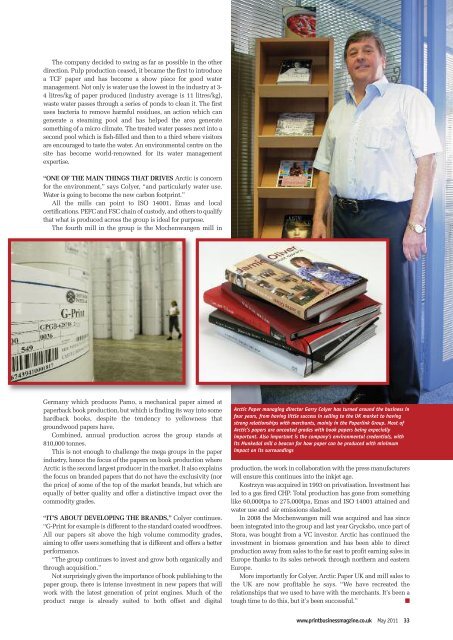The UK's favourite print show - MacMate
The UK's favourite print show - MacMate
The UK's favourite print show - MacMate
Create successful ePaper yourself
Turn your PDF publications into a flip-book with our unique Google optimized e-Paper software.
<strong>The</strong> company decided to swing as far as possible in the other<br />
direction. Pulp production ceased, it became the first to introduce<br />
a TCF paper and has become a <strong>show</strong> piece for good water<br />
management. Not only is water use the lowest in the industry at 3-<br />
4 litres/kg of paper produced (industry average is 11 litres/kg),<br />
waste water passes through a series of ponds to clean it. <strong>The</strong> first<br />
uses bacteria to remove harmful residues, an action which can<br />
generate a steaming pool and has helped the area generate<br />
something of a micro climate. <strong>The</strong> treated water passes next into a<br />
second pool which is fish-filled and then to a third where visitors<br />
are encouraged to taste the water. An environmental centre on the<br />
site has become world-renowned for its water management<br />
expertise.<br />
“ONE OF THE MAIN THINGS THAT DRIVES Arctic is concern<br />
for the environment,” says Colyer, “and particularly water use.<br />
Water is going to become the new carbon foot<strong>print</strong>.”<br />
All the mills can point to ISO 14001, Emas and local<br />
certifications. PEFC and FSC chain of custody, and others to qualify<br />
that what is produced across the group is ideal for purpose.<br />
<strong>The</strong> fourth mill in the group is the Mochenwangen mill in<br />
Germany which produces Pamo, a mechanical paper aimed at<br />
paperback book production, but which is finding its way into some<br />
hardback books, despite the tendency to yellowness that<br />
groundwood papers have.<br />
Combined, annual production across the group stands at<br />
810,000 tonnes.<br />
This is not enough to challenge the mega groups in the paper<br />
industry, hence the focus of the papers on book production where<br />
Arctic is the second largest producer in the market. It also explains<br />
the focus on branded papers that do not have the exclusivity (nor<br />
the price) of some of the top of the market brands, but which are<br />
equally of better quality and offer a distinctive impact over the<br />
commodity grades.<br />
“IT’S ABOUT DEVELOPING THE BRANDS,” Colyer continues.<br />
“G-Print for example is different to the standard coated woodfrees.<br />
All our papers sit above the high volume commodity grades,<br />
aiming to offer users something that is different and offers a better<br />
performance.<br />
“<strong>The</strong> group continues to invest and grow both organically and<br />
through acquisition.”<br />
Not surprisingly given the importance of book publishing to the<br />
paper group, there is intense investment in new papers that will<br />
work with the latest generation of <strong>print</strong> engines. Much of the<br />
product range is already suited to both offset and digital<br />
Arctic Paper managing director Garry Colyer has turned around the business in<br />
four years, from having little success in selling to the UK market to having<br />
strong relationships with merchants, mainly in the Paperlink Group. Most of<br />
Arctic’s papers are uncoated grades with book papers being expecially<br />
important. Also important is the company’s environmental credentials, with<br />
its Munkedal mill a beacon for how paper can be produced with minimum<br />
impact on its surroundings<br />
production, the work in collaboration with the press manufacturers<br />
will ensure this continues into the inkjet age.<br />
Kostrzyn was acquired in 1993 on privatisation. Investment has<br />
led to a gas fired CHP. Total production has gone from something<br />
like 60,000tpa to 275,000tpa, Emas and ISO 14001 attained and<br />
water use and air emissions slashed.<br />
In 2008 the Mochenwangen mill was acquired and has since<br />
been integrated into the group and last year Grycksbo, once part of<br />
Stora, was bought from a VC investor. Arctic has continued the<br />
investment in biomass generation and has been able to direct<br />
production away from sales to the far east to profit earning sales in<br />
Europe thanks to its sales network through northern and eastern<br />
Europe.<br />
More importantly for Colyer, Arctic Paper UK and mill sales to<br />
the UK are now profitable he says. “We have recreated the<br />
relationships that we used to have with the merchants. It’s been a<br />
tough time to do this, but it’s been successful.” n<br />
www.<strong>print</strong>businessmagzine.co.uk May 2011 33


